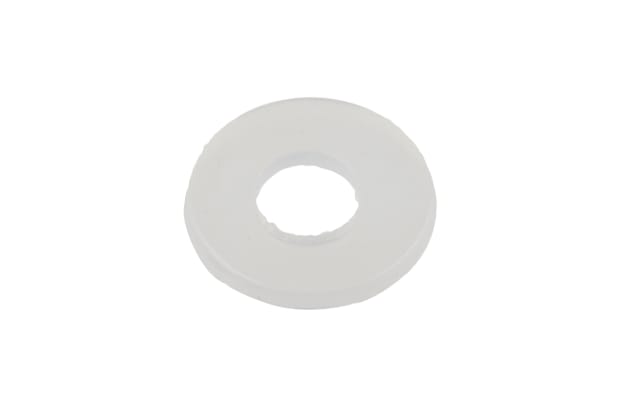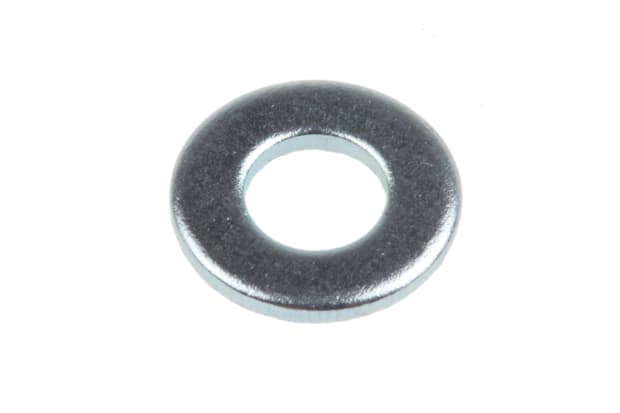- Published Mar 9, 2023
- Last Modified Jun 12, 2024
- 9 min
Expert Guide to Choosing Tap Washers

What is a Tap Washer?
What is the Definition of a Tap Washer?
Tap washers, also referred to as sealing washers or packing washers (in some tap varieties), are straightforward disc-shaped components with a central aperture. They act as a form of gasket, aiding in sealing off the mains water flow behind a tap when the tap handle is turned to the ‘off’ position.
What Can Tap Washers Be Used for?
Tap washers are typically included in plumbing kits and toolboxes. Most often, tap washers are used for quick replacement tasks. Generally, they serve as the preferred fix whenever a tap drips, leaks, or becomes hard to operate. Some instances where tap washers are utilized include:
- Basin mixer tap washers
- Bath tap washer replacements
- Hot water tap washers
- Kitchen tap washers
- Lever tap washer replacements
- Mixer tap washers
- Outside tap washers
- Pillar tap washers
- Swan neck tap washers
What is the Purpose of a Tap Washer?
Tap washers are essential components used in almost all types of taps, primarily to regulate water flow. They also help to prevent leaks and contamination when the tap is closed. No matter the type or material of the washer, their fundamental function is to press against the seat or flow valve inside the tap assembly. This creates a sealed barrier that stops water from reaching the spout when the tap handle is turned to the 'off' position.
How Do Tap Washers Function?
They serve their purpose by forming a watertight barrier between the tap seat and the spout. The construction material of most tap washers allows them to fill and smooth out any uneven gaps between different parts of a tap fitting (typically the valve and the tap seat), effectively sealing off the tap spout from the valve.
When a tap head is turned on or off, a rotating screw causes the tap washer to move up or down (respectively) within the tap assembly. This lifts it away from the seat and opens the flow valve, allowing pressurized mains water in the plumbing system to flow through the tap spout at varying volumes and speeds. Tap washers are usually made from materials that can be compressed to form a watertight seal (although there are exceptions for certain tap types). This allows them to seal the valve opening more effectively, even when general wear and tear have caused small surface irregularities over time.
However, there is a limit to the amount of wear a washer, seat, or valve opening can endure before the sealing properties are no longer effective. Eventually, the washer or other moving parts of a tap will need to be replaced. This is most often due to damage from water erosion or physical stress and degradation caused by repeated mechanical or compression forces during normal use.
Various Options of Tap Washer
There are various different types of tap washers for sale, particularly when it comes to manufacturing materials and sizes. Below, you'll discover a brief overview of the primary tap washer varieties suitable for different types of taps.
Nylon Tap Washers
Nylon tap washers are widely favored for effectively sealing tap valves shut. Thanks to their unique properties, these nylon spacer washers ensure a dependable seal on various types of taps.
Typically, nylon sealing washers are chosen for offering:
- High strength
- Very good all-round wear resistance
- Low surface friction properties (nylon has a degree of natural internal lubrication) meaning it is less likely to deteriorate as quickly over time
- Reasonably chemically inert, and able to cope well with a wide range of potentially corrosive environments and substances without reacting
- Suitable for use at a wide range of temperatures without deforming
- Lightweight
- Plain nylon tap washers are cheap to manufacture and buy
- Some professionals prefer to use slightly softer parts than nylon tap washers when inserting them between very hard metals. Nylon is often favored for softer metals, such as brass
Rubber Tap Washers
Rubber tap washers are a frequently favored option for effectively sealing various types of bath and sink taps. These sealing washers, made of rubber, are available in a diverse range of standard sizes. Common sizes include the 15mm, 1-inch, 32mm, and 40mm rubber washers.
In terms of durability and functionality in tap washers, rubber exhibits many properties similar to nylon. However, it is notably softer and more flexible as a material. This characteristic enables it to form a superior seal against harder surfaces or in instances of greater surface irregularity.
Rubber washers and gaskets undergo more significant displacement and distortion compared to certain other materials when subjected to high compression forces. Consequently, prolonged usage may result in heightened indications of wear.
In the case of inexpensive rubber tap washers, dripping and leakage often stem from the gasket's eventual cracking, splitting, or crumbling. Conversely, sturdier materials like nylon are inclined to lose their sealing effectiveness due to general surface wear, scarring, and erosion of their profile.
Fiber Tap Washers
The distinctive characteristic of a fiber tap washer, sometimes known as vulcanized fiber washers, lies in its innate ability to expand upon contact with moisture. This feature, theoretically and often practically, enhances its effectiveness as a sealing agent.
Fiber washers, widely employed across various plumbing applications, generally offer greater compressibility compared to rubber or nylon counterparts. This attribute reduces the immediate risk of physical damage due to excessive tightening, potentially extending their lifespan depending on the tap type and usage patterns. However, this flexibility may necessitate additional turns or manual force to fully shut off the tap compared to other washer types.
Regarding replacement factors, while nylon eventually wears out and rubber may split or crumble, vulcanized tap washers typically deteriorate or degrade over time.
Ceramic Tap Washers
Ceramic tap washers, sometimes referred to as ceramic disc washers, are commonly found in newer tap assemblies. Typically installed in 'quarter-turn' taps and monoblocks (mixer taps), these washers eliminate the need for multiple rotations of the tap head to control water flow.
Unlike traditional sealing washer types, ceramic tap washers operate differently. Instead of using nylon, rubber, or fiber washers, they employ a pair of closely fitting slotted ceramic discs. One of these discs remains stationary, while the other can rotate up to 90 degrees, equivalent to a quarter-turn.
In the 'on' position, the slots in both discs align, facilitating water flow through the spout. When the tap is turned off, one ceramic disc rotates to misalign the slots, effectively blocking water passage.
There are various advantages to this type of mechanism:
- Ceramic tap washers are hard-wearing and highly resistant to water erosion, meaning that they tend to last a long time
- They’re very low friction in operation, further contributing to both longevity and a smoother, easier tap action - hence being used more often on lever-style taps
- While they will eventually need replacing just like any other washer, ceramic discs are widely available, and there are relatively few different size options to choose between when it comes to ceramic tap washer spares
How to Choose the Right Tap Washer
When it comes to selecting tap washers, the most important choice usually comes down to picking out the right size for your tap assembly. While many taps can cope with a range of washer types (with the exception of ceramic disc taps), one particular tap washer material will probably be best for your specific install location, tap type, and general style of use.
Tap Washer Choices by Size
What type of tap washer should I buy? The one aspect that tends to cause more confusion and uncertainty than any other regarding this question is often getting the correct sizing.
Depending on the tap type and the specifics of its assembly, you may need large tap washers, mudguard washers, small tap washers, or even mini versions. Commonly used washer sizes for various indoor or outdoor taps include:
- 1-inch tap washer
- 15mm tap washer
- 16mm tap washer
- 9mm tap washer
- 17mm tap washer
- 20mm tap washer
- 32mm tap washer
- 40mm tap washer
Similarly, it’s worth noting that many tap washers are also listed and sold by metric or ‘M’ size ratings (M3, M4, M8, M10, etc).
By far the easiest way to ensure you’re picking out the right washer size for your tap is to physically remove the old one and measure it. That way, when you decide to buy tap washers online, you’ll be able to sort products by the exact size you need with a single click.
Alternatively, if you are a professional or are working with multiple different types of tap, it can be more economical to simply buy a tap washer replacement kit. These come with a range of common washer sizes, so you’ll be covered for almost any replacement you need.
Compare Tap Washers
If you’re trying to make a decision between different types and sizes of commonly-used tap washer products - for example, rubber tap washers vs nylon or fibre - it can be helpful to compare tap washers directly. The table below should help with this, giving a general illustration of some typical uses for various different washer kinds and sizes.
How Do You Replace a Tap Washer?
Can I change a tap washer myself?
In most cases, the answer is yes. However, you will need access to a few common tools, plus to have a basic understanding of the role and function of a tap washer. You will also need to have familiarised yourself with the main parts of a tap assembly.
Fitting a new tap washer is not a particularly lengthy or complex fix. It will generally be a fairly hassle-free experience, provided you prepare the area properly, and learn the key steps to the job before you start. Important steps to take before tackling a tap washer replacement include:
- Blocking off the drain or plug hole (to prevent loss of any small components or fasteners)
- Shutting off the water supply to the tap you’re working on prior to any disassembly
Related Products
Tap Washers
Browse and shop tap washers online today, including products from RS PRO, our own in-house range.
Plain Washers
Plain washers are an essential part of any fastener assembly. Browse our extensive range online today.
Locking Washers
Explore locking washers and find a wide range of products to suit your requirements with RS.
Related links
- The Ultimate Guide to Understanding Cable Glands
- A Complete Guide to Anemometers
- Everything You Need to Know About Hacksaws
- Sprocket Essentials: From Basics to Advanced Tips
- A Complete Guide to Magnetic Tape
- Transform Your DIY Game Using Our Essential Jigsaw Guide
- The Complete Guide to Torches
- The Complete Guide to Stepper Motors


